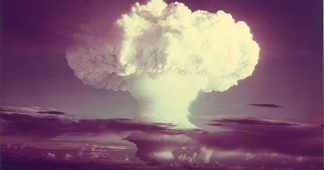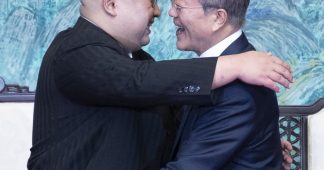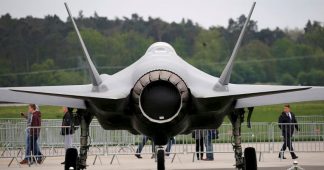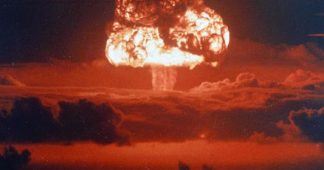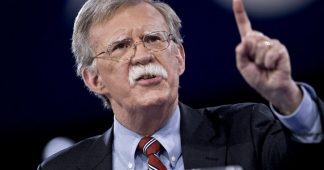Posted on Categories
Lieutenant General Scott Berrier, director of the Defense Intelligence Agency, presented his agency’s annual World Threat Assessment before the Senate Armed Forces Committee on April 29.
The transcript of his testimony runs to fifty-seven pages and is broad in its scope and often detailed in its descriptions, so what follows is a précis and one that dwells on the overarching theme of his presentation, leaving aside, for example, his discussion of the threats posed by what were formerly termed terrorist organizations and are now called violent extremist organizations (VEOs).
His comments largely passed unnoticed as such generally are outside the American governing and military castes except for a CNN report of them that bears the title Top US military intelligence official says Russian military poses an ‘existential threat’ to the US.
His analysis of threats, military and non-military, to the U.S. and its allies is entirely in keeping with those of other leading military, intelligence and foreign policy officials: four nations threaten the world, threaten it separately but mainly in conjunction with each other and threaten it on every continent and in every sea and ocean. The four nations, collectively the new Axis of Evil, are Russia, China, Iran and North Korea. To employ the terms now in vogue in American military, intelligence and what can loosely be called diplomatic circles, the four are divided into near-peer and non-near-peer challengers and adversaries. The U.S. readily acknowledges it has no military equal in the world – and intends to keep it that way – except insofar as Russia maintains nuclear parity with it.
Russia and China are near-peer threats. Iran and North Korea aren’t at that level. But all four are presented as nuclear threats.
His perspective is shared by other U.S. military, intelligence and foreign policy departments, commands and agencies as well as NATO:
Indo-Pacific Command (p. 6-9)
Southern Command (p. 31-38)
American intelligence agencies
North Atlantic Treaty Organization
Berrier started his testimony by accusing all four of the above of exploiting the global COVID-19 crisis.
China was dealt with first and was characterized as “a major security challenge [which] remains a long-term strategic competitor to the United States.” His description of that threat included the fact that “China undertook a range of military missions including power projection, sea-lane security, counterpiracy, peacekeeping operations, and humanitarian assistance and disaster relief.” Much as any more or less populous nation has done in recent decades.
But he reserved his main criticism for Russia, uttering the alarmist concern picked up on by CNN that:
“The Russian military is an existential threat to the United States and a potent tool designed to maintain influence over the states along its periphery, compete with U.S. global primacy, and compel adversaries who challenge Russia’s vital national interests.” (p. 13)
That the above sentence would apply to the U.S. far more than to Russia seems to escaped the director’s attention, but he did highlight Russia’s real threat: the potential to compete with U.S. global primacy. That in itself poses an existential threat evidently.
He said that Russia presents a threat to the American homeland because it “continues to invest in its strategic nuclear forces, in new capabilities to enhance its strategic deterrent….”
It is further guilty of threatening Peoria or Kansas City because its “military strength is built on its survivable strategic nuclear forces and a conventional force largely postured for defensive and regional operations.” Please note the words deterrent, defensive and regional: words unknown to Washington and the Pentagon, or if known not in any manner limiting their self-aggrandized prerogative of global power projection.
Russia is accused of incorporating lessons learned in Syria for training and exercises. Every military power since Persia and Rome has done the same, of course.
It is also at least implicitly criticized for an exaggerated and irrational belief that its main threats are the U.S. and NATO. That the latter two have ringed Russia in from the Arctic Circle to the Black Sea with nuclear submarines, guided-missile warships, fighter jets, long-range nuclear-capable bombers, anti-ballistic missiles, armored vehicles, bases, troops and cyber warfare centers is simply the pretext, Berrier argued, for Moscow to exploit the issue for the “the preservation of the ruling regime.”
And to compound its threat to the U.S. and NATO, Russia is “disrupting NATO’s cohesion and its ability to formulate effective policies to counter Russian malign influence.” That sounds very much like self-defense, a principle universally recognized in international as well as criminal law.
Russia is accused of particularly targeting NATO member states with “historical, cultural, or religious affinities” to it. (p. 14) That would suggest countries which primarily speak Slavic languages and practice Orthodox Christianity. Neither affinity is particularly favored by the West’s new rules-based international order.
He also repeated the oft-heard accusation that Russia employed the “military grade nerve agent” Novichok against Sergei and Yulia Skripal in Britain in 2018 and recently against Alexei Navalny at home. At NATO headquarters in March U.S. Secretary of State Antony Blinken described the first incident as the use of chemical weapons on the soil of a NATO nation.
Russia is also denounced by Berrier for its role in Georgia since 2008 and in Ukraine since 2014, while he touted the fact that “Georgian, Ukrainian, and Azerbaijani security cooperation with NATO partners” is a source of Russian irritation; though he did point out that the Putin government ignored the Azerbaijani-Turkish attack on Nagorno-Karabakh and Russia’s Collective Security Treaty Organization ally Armenia last year; one which has resulted in Russia welcoming troops from NATO powerhouse Turkey into the South Caucasus. He also acknowledged Russia’s collaboration with Turkey in Syria and Libya, although the two nations back opposing belligerents in both instances.
In more abbreviated form, as otherwise the recital will be endless, Russia is accused of conniving with almost all the bad actors as they were formerly referred to, now malign influences, in the world, in most every part of it, by engaging in behavior including but not limited to:
Expanding military ties and engaging in joint exercises with China.
Maintaining standard state-to-state relations with Iran and North Korea. (p. 19)
Continuing Soviet-era ties with Algeria and Angola in Africa. (p. 18)
Doing the same in Central America with Nicaragua and in the Caribbean with Cuba as well as providing defensive weapons to Venezuela in South America. (p. 19)
Not content to present Russia as being a threat to North America, Central America, South America, Europe, the Middle East, Asia and Africa, the Defense Intelligence Agency also portrays it as a rival and adversary in the Arctic – “Russia is…expanding its network of air and coastal defense missile systems, thus strengthening its anti-access/area-denial capabilities over key portions of its Arctic maritime zone (p. 20) – and the Antarctic – “Moscow is…expanding its fishing activities there and, alongside China, has blocked international environmental conservation efforts to limit fishing in the area. (p. 20)
Though Russia remains the sole “existential” threat to the heartland of America, to Midtown, U.S.A., it is also the ringleader of an international conspiracy directed against the U.S. and its democratic allies around the world in the minds of Berrier and those he serves. That nefarious network of evildoers’ evil deeds include:
North Korea selling arms to Iran and Syria.
China supporting North Korea.
Iran’s involvement in Syria, Iraq and Yemen, where Berrier presents Tehran as the sole villain except for Russia in Syria. (Though Berrier admits that a Turkish military incursion there displaced 70,000 civilians, adding, “Another Turkish incursion in northern Syria would also likely displace hundreds of thousands of civilians, as witnessed in 2018 and 2019.” But Turkey is a valued NATO ally.)
China ensnaring Cuba in its Belt and Road Initiative.
Russian ally Algeria backing the Polisario Front in Western Sahara where there seems an imminent threat of a Western-supported invasion by NATO partner Morocco.
China and Iran conspiring with Russia to support the government of Venezuela, “which almost certainly mitigates the economic effects of international sanctions.” (See Chinese, Russian, and Iranian Presence and Security Influence in the Region. p. 48. E.g., “Tehran seeks to leverage its recent sales with Venezuela to expand Iran’s regional footprint in Latin America.”)
Matters couldn’t be more clear to America’s civilian and military foreign policy planners and those of its NATO allies. All’s right in the world of 194 United Nations members except for threats posed by Russia, China, Iran and North Korea. Especially Russia.
Rick Rozoff is a contributing editor at Antiwar.com. He has been involved in anti-war and anti-interventionist work in various capacities for forty years. He lives in Chicago, Illinois. He is the manager of Stop NATO. This originally appeared at Anti-Bellum.
Published atnews.antiwar.com
